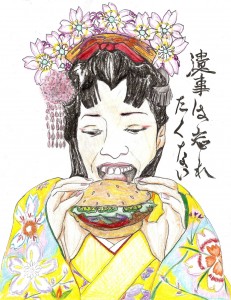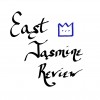Nonfiction: A Cheeseburger and Pickles
Keiko Amano

Tamasaburou Kitayama ©2014
I came to the U.S. for the first time in June 1970. I wished I would be able to speak English in no time. I was nineteen. Shortly after, I attended Palomar Junior College in San Marcos. The following is an excerpt from one of my stories. This day, I was in the cafeteria waiting for my turn to place an order.
“Next! What would you like, young lady?” a waitress says to me, holding a yellow pencil in her left hand.
“Hamburger and 7-up, please,” I say.
“Would you like a hamburger or a cheeseburger?” she says with a broad smile.
The waitress looks like Alice, the housekeeper of the Brady Bunch. Over the counter, a male cook picks up a stainless-steel spatula and turns over hamburger patties. A sizzling sound echoes. He puts a piece of bright yellow cheese on top of each patty. They look yummy. Those hamburgers probably come with cheese or without cheese.
“Hamburger and cheese and 7-up, please,” I say.
“Do you want a hamburger or cheeseburger?” she says looking into my eye.
I pursed my lips. My heart begins pounding. I don’t turn back, but people are behind me. I have to hurry up. Maybe I should use the word “with” instead of “and” because a piece of cheese will melt and stick with a patty like a mother holding her child’s hand.
“Hamburger with cheese, please,” I say.
“Do you want a hamburger?” the waitress says making her chin double.
People must be staring at me.
“A cheeseburger?” she says without changing her tone.
“Yes.”
I wonder what difference a cheeseburger and a hamburger with cheese make. I can recognize burger and cheeseburger as a pair, and hamburger and cheesehamburger can also be a pair, but the pair of hamburger and cheeseburger throws me off. I used to think English was logical. Maybe her mind works in a different way because she is left handed. I hadn’t had any friends or acquaintances that used their left hand except my grandfather. My grandfather used a pair of scissors with his left hand and wrote using his right hand.
“What would you like to drink, dear?” the waitress says.
“7-up, please,” I say.
“What?” she says.
“7-up,” I say louder.
“Coke?”
“Yes.”
I wish I would be able to pronounce 7-up like Americans. I’m disappointed and frustrated, but I don’t know what to do about it.
❖
The scene above happened almost 40 years ago. The following scene is from March 2009 at the Subway restaurant in San Dimas. I made an order for a six-inch combo with Italian herb bread.
“No pickles, please,” I say to the young worker.
“Would you like jalapeños?” she says to me.
“No, no jalapeño, please,” I say.
“Would you like pepperchinos?” she says picking up a few strips of yellow pickles. She almost drops them on my sandwich.
“No, no. No pickles, please.”
She drops the yellow strips back to the container. I had the similar conversation at the place every time I went in to place my order. I chatted with most of the workers there. They recognized my face but not my preference for no pickles. One day, I went there late. I was the only customer. I thought this was a good opportunity to explain myself if they asked me about pickles again.
“You don’t like pickles, do you?” another worker says to me with a smile.
“I love pickles, but lately I can’t eat too sour foods. It bothers my skin,” I say. “Please, no pickles.”
“Okay,” he says, smiling. “Do you want jalapeños? Jalapeño is not pickles.”
“No jalapeño. Pickles mean processed vegetables with either salted water or vinegar,” I say and point to the bin of fresh cucumbers, “That’s fresh cucumber slices, but the other is pickled cucumber. You know what I mean? Those jalapeños or pepperchinos are also pickles.”
We went into more detail about pickles, and we burst into laughing. We began using the word “family.” The family of pickles. I thought I finally achieved my goal in our communication. I was happy.
But life is not easy. My next visit there, my situation went back to the way it used to be. A server asked me about pickles again.
Going back to cheeseburger, to me, the word connects to a brilliant comedian, John Belushi. In the television program “Live from New York, it’s Saturday Night!” he played a cheeseburger cook. He shouted, “Cheeseburger, cheeseburger, cheeseburger!” no matter what customers, other cooks, or waitresses said. I love those sketches and the character.
Almost forty years has passed since my cheeseburger incident. My language development was long and slow, but I thought I made my progress. But the pickle incident sent me back to my original question. How do native English speakers think behind their words? It is still a mystery.
